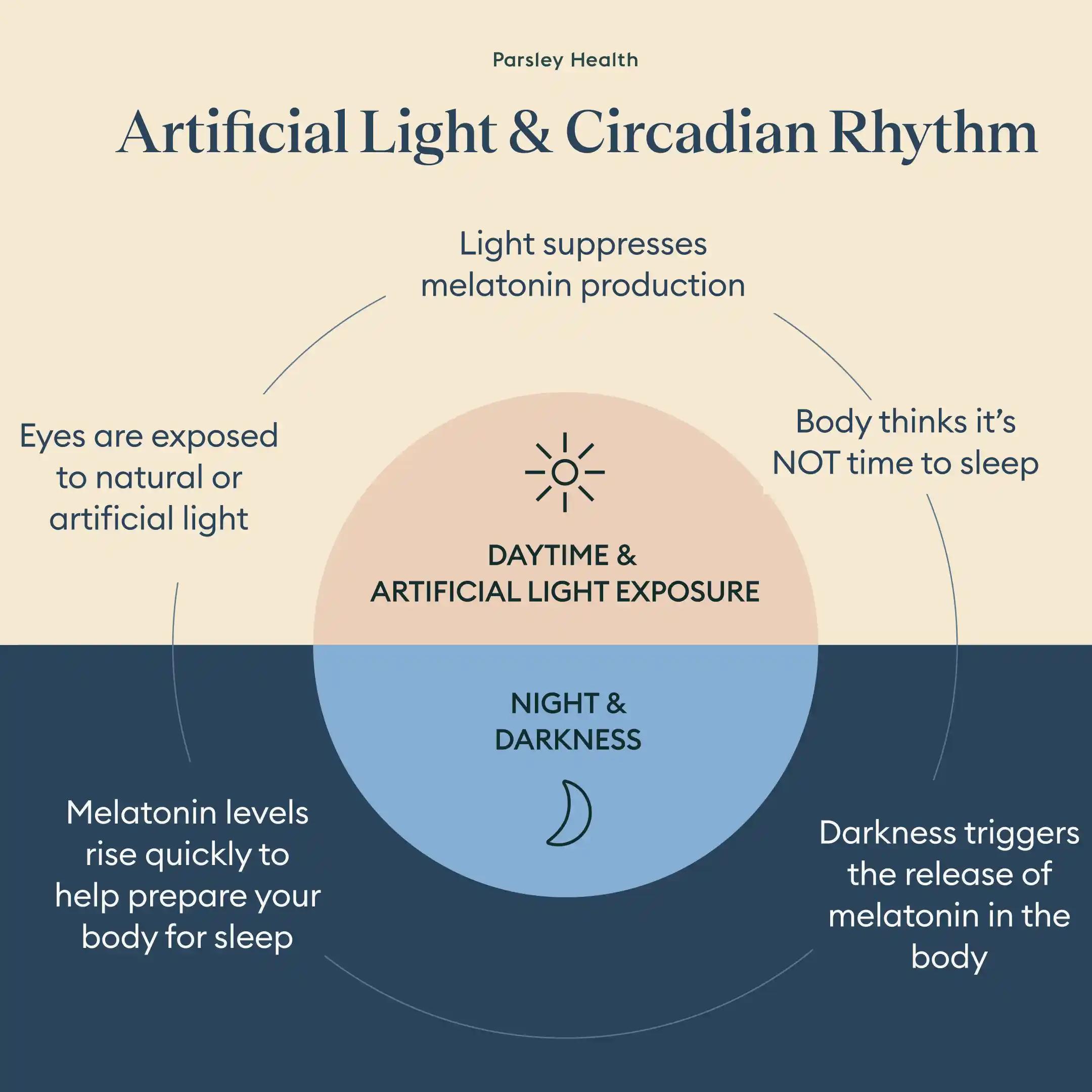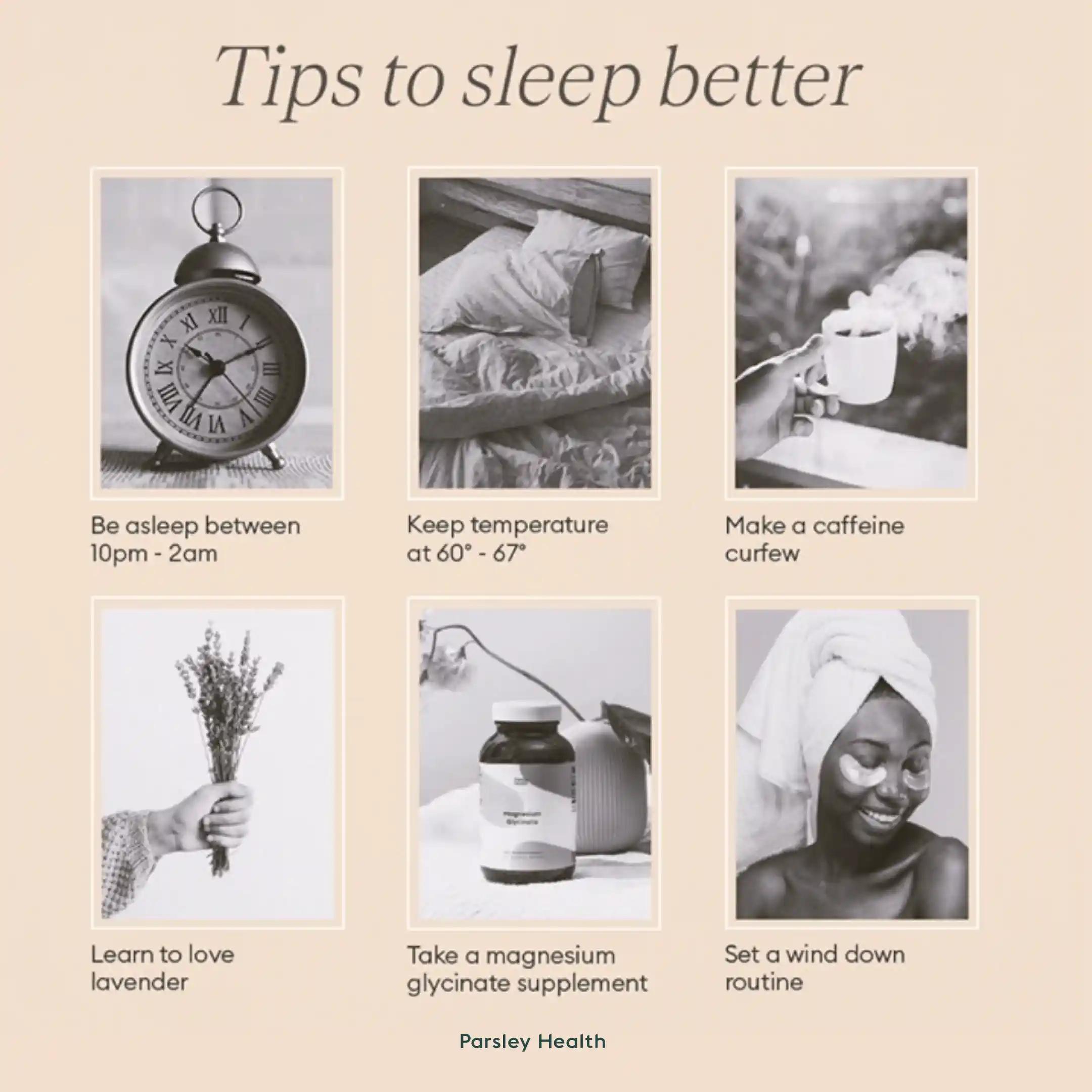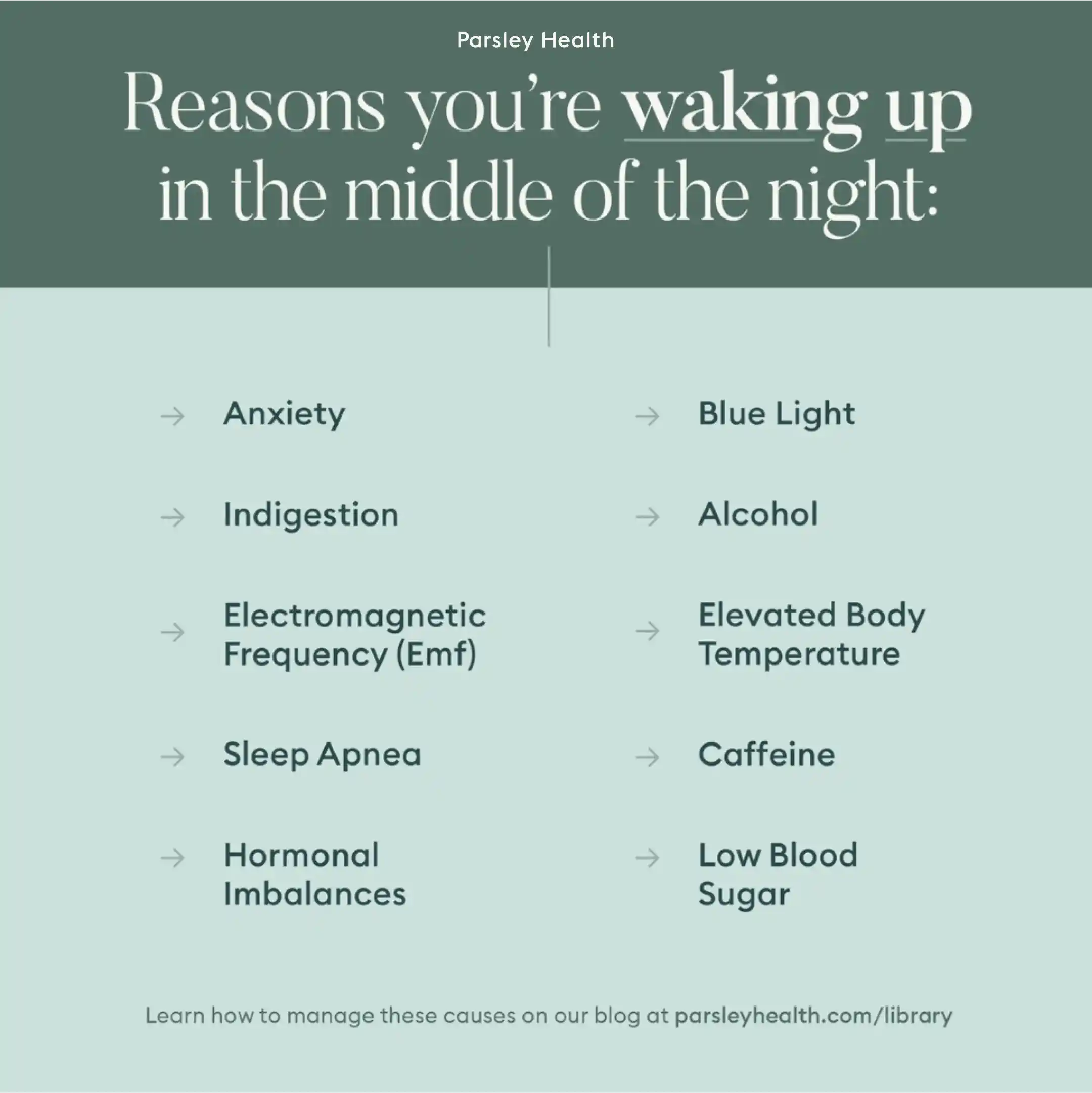Many people try melatonin hoping it will help them fall asleep faster or stay asleep longer, yet a common question clinicians hear is: “Why doesn’t melatonin work for me?” If you’ve taken melatonin and still find yourself staring at the ceiling at night, you’re not alone.
Melatonin is a hormone your body naturally produces to help regulate your sleep-wake cycle. While melatonin supplements can be helpful in certain situations, they don’t work for everyone, and they’re not always the right solution for chronic sleep issues. In some cases, melatonin may be taken when it isn’t needed at all. In others, timing, dosage, or underlying sleep disruptors can affect whether it works.
In this article, we’ll explore what melatonin actually does, when it may (and may not) be effective, common reasons it doesn’t seem to help, and alternative ways to support better sleep, especially if melatonin hasn’t worked for you.
What is melatonin? Does melatonin work?
Melatonin may not work for everyone. To understand why, we need to take a closer look at what melatonin is and the way it works.
Melatonin is a hormone that signals the body to prepare for sleep. It's produced by the pineal gland—a pea-sized structure in the middle of the brain.
Light from the sun during the day and darkness at night control melatonin levels. Light and darkness therefore sync our circadian-rhythm, our body's sleep-wake cycle.
 Our retinas have photoreceptors, cells that are sensitive to light. In the morning, when our eyes are exposed to light, the suprachiasmatic nucleus (SCN) in the brain's hypothalamus receives electrical signals. The SCN is our body's master clock, and it syncs the "clock genes" throughout our body. Light suppresses melatonin production through its influence on the SCN, which influences the pineal gland.
Our retinas have photoreceptors, cells that are sensitive to light. In the morning, when our eyes are exposed to light, the suprachiasmatic nucleus (SCN) in the brain's hypothalamus receives electrical signals. The SCN is our body's master clock, and it syncs the "clock genes" throughout our body. Light suppresses melatonin production through its influence on the SCN, which influences the pineal gland.
When the sun goes down, the same processes help signal melatonin secretion. In response to darkness, melatonin levels rise quickly to help prepare your body for sleep.
However, artificial light, including from our electronic devices or from light pollution in cities, can trick the brain into thinking we're still in daylight. This suppresses our production and secretion of melatonin. That’s why you may not get sleepy when you’re scrolling on your smartphone or tablet, when watching TV, or when a street light shines through your bedroom window.
Around one-fifth of adults in the United States report not getting enough sleep, according to a 2022 study published in JAMA, the journal of the American Medical Association.
Millions of people turn to supplemental melatonin as a solution for trouble falling asleep. The researchers found that of the more than 55,000 participants surveyed, more than 2% use melatonin supplements.
However, melatonin may not work for everyone.
Not sure what your symptoms are really telling you?
The Parsley Symptom Index helps connect the dots across your whole body so you can understand patterns, not just isolated symptoms.
Why melatonin may not work for you
Melatonin helps tell the body when it’s time to go to sleep and wake up. But it doesn’t actually make you fall asleep.
If traveling to another time zone or working overnight shifts have disrupted your natural sleep pattern, taking melatonin can help reset your confused body and brain.
Melatonin has been shown in some studies to work modestly for some sleep issues. For example, a 2013 analysis of 19 studies involving more than 1,500 participants showed that melatonin helps do the following.
- Reduces time falling asleep
- Increases total sleep time
- Boosts sleep quality
However, additional research shows that evidence of melatonin supplementation's effectiveness is limited.
Discuss melatonin supplements with your doctor before buying or using. You may be wasting your money by inappropriately supplementing for your specific issue, and as a result, see no change.
People who would most benefit from melatonin are those who need to adjust their circadian rhythm, such as those with jet lag, overexposure to blue light, or with inconsistent sleep patterns, such as shift workers.
Among individuals 66 and older, treatment with melatonin also seems to be more effective than in younger populations. This might be due to a few factors, including that melatonin levels decline with age. This decline may exacerbate sleep disorders, and melatonin supplements may help.
If it’s been frustrating that melatonin doesn’t do much for you, it may be because the root cause—like hormone imbalances or stress—isn’t being addressed. At Parsley Health, our clinicians often blend deep clinical care with functional lab insights to help women uncover what’s really keeping them from sleep, and support that with personalized strategies.
However, if you have a sleep problem that is caused by anxiety or another hormonal issue, then melatonin may not work to ease your sleep issues. Read on to find out about alternative sleep solutions.
Is melatonin safe?
Although melatonin is considered a natural sleep aid, it is a hormone that has potential side effects when supplemented. Most people take melatonin with no problems at all, but if you are thinking of trying it, these issues could arise.
- Morning drowsiness or daytime sleepiness
- Vivid dreams
- Small changes in blood pressure
- Nausea
- Headaches
- Dizziness
- Agitation
How much melatonin do you need?
Taking too much melatonin could exacerbate potential side effects, including feeling sluggish in the morning.
You only need a small dose of melatonin to support your natural sleep cycle, if at all. Taking as little as 1 to 3 milligrams about an hour before you go to bed may be all you need.
However, larger doses, 10 milligrams or more, may be used to treat certain health conditions under the guidance of a doctor.
If supplementation still doesn’t work for you, your sleep problems may have other causes and will need further investigation by a medical provider.
Healing stories from our members
Alternative methods to improve sleep
While melatonin can be helpful in some cases to regulate the sleep cycle, supplementing does not need to be your first line of defense against sleepless nights.
Many of our members find that optimizing their environment and wind-down habits is essential—but it’s not always the full picture. That’s where Parsley Health’s functional medicine model comes in, combining one-on-one care with clinical labs to identify underlying factors like hormone shifts or stress that might be interfering with rest.
For many of our Parsley Health members with sleep issues, establishing a nightly routine has helped. Here's how.
- Dim household lights or switch bedroom lightbulbs to amber options.
- Avoid screens about an hour before sleep.
- Avoid excessive alcohol use or consumption too close to bedtime.
- Avoid caffeine consumption after noon.
- Do something that helps calm you before bed (e.g., take a bath, read, etc.)
- Try to be as consistent as possible with your sleep and wake times, even on weekends.
- Keep your room cool.
 If you still can't fall asleep after trying these tips, our doctors and other providers can help provide insight around additional tools, such as meditation, deep breathing, and journaling, that can help to manage stress levels prior to hitting the pillow.
If you still can't fall asleep after trying these tips, our doctors and other providers can help provide insight around additional tools, such as meditation, deep breathing, and journaling, that can help to manage stress levels prior to hitting the pillow.
Studies show mindfulness-based stress reduction practices such as these help to improve the quality, duration, and onset of sleep even in those with diagnosed sleep disorders.
Additionally, cognitive behavioral therapy for insomnia (CBT-i) is a safe and effective treatment.
If you’ve tried meditation, melatonin, and mindfulness without any improvement, our providers regularly help find the root cause of sleep disturbances. We analyze the gut microbiome and hormone levels such as cortisol to address any underlying imbalances that may be impacting your sleep.
When to seek professional help for sleep issues
Good quality and quantity of sleep are essential for overall health and well-being. If you've tried addressing your sleep hygiene with the practices mentioned in this article and are still having sleep difficulties, it might be time to look deeper and speak with a doctor. That’s also when functional medicine clinicians like ours at Parsley Health—who use clinical assessments and targeted labs—can help make sense of how sleep, stress, and hormones interconnect for a more root-cause path to better rest.
Parsley Health offers physician-led functional medicine care, advanced lab programs, and flexible ways to get started, all designed to help you feel better over time.
 Frequently asked questions melatonin to improve sleep quality
Frequently asked questions melatonin to improve sleep quality
What does it mean if melatonin doesn't work?
Melatonin is a hormone that helps signal the body to sleep. However, melatonin supplements don't work for every sleep difficulty. If you're having sleep issues, such as taking a long time to fall asleep, having trouble falling asleep, or waking frequently, you may have an underlying condition that needs treatment.
What if you take melatonin and don't sleep?
Melatonin doesn't make you fall asleep. It's a hormone that aids your sleep-wake cycle. Underlying conditions and lifestyle factors unrelated to melatonin can also affect sleep.
Why doesn't melatonin work for me with ADHD?
Taking melatonin may help address some sleep disturbances in people with attention deficit hyperactivity disorder (ADHD). However, many factors affect sleep, and melatonin supplements may not work for everyone.
What happens if your body doesn't release melatonin?
Some people have circadian-rhythm abnormalities or underlying conditions that may affect melatonin production and release. In these cases, they may have trouble falling asleep and may need advanced sleep solutions as prescribed or recommended by their doctor.
Improving Overall Sleep Quality Naturally
Melatonin is a hormone that helps regulate our sleep-wake cycle. Some people take melatonin supplements to help them fall asleep. However taking melatonin may not work for everyone.
If you give melatonin a try, start off with a low dose and see how you do. As little as 1 to 3 milligrams may be enough.
If taking melatonin doesn't work for you, working with a Parsley provider to establish better sleep habits and investigate underlying causes of sleep disturbances can help improve sleep quality.
Ready for better sleep? Schedule a free call to learn more about our root-cause approach, how to pay for Parsley Health with insurance, and how we can personalize your health journey.
 Our retinas have photoreceptors, cells that are sensitive to light. In the morning, when our eyes are exposed to light, the suprachiasmatic nucleus (SCN) in the brain's hypothalamus receives electrical signals. The SCN is our body's master clock, and it syncs the "clock genes" throughout our body. Light suppresses melatonin production through its influence on the SCN, which influences the pineal gland.
Our retinas have photoreceptors, cells that are sensitive to light. In the morning, when our eyes are exposed to light, the suprachiasmatic nucleus (SCN) in the brain's hypothalamus receives electrical signals. The SCN is our body's master clock, and it syncs the "clock genes" throughout our body. Light suppresses melatonin production through its influence on the SCN, which influences the pineal gland.






 If you still
If you still  Frequently asked questions melatonin to improve sleep quality
Frequently asked questions melatonin to improve sleep quality